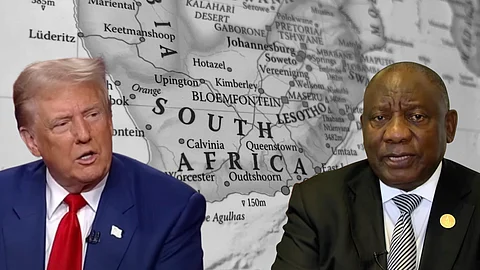

Donald Trump has announced that he will be cutting all future funding to South Africa in response to the nation's controversial new land expropriation law.
The president said he would be turning off the taps until a "full investigation" was completed.
"South Africa is confiscating land, and treating certain classes of people VERY BADLY," Trump wrote in a post on X. "It is a bad situation that the Radical Left Media doesn’t want to so much as mention. A massive Human Rights VIOLATION, at a minimum, is happening for all to see."
He went on to declare that the United States "won't stand for it," and "will act," by "cutting off all future funding to South Africa until a full investigation of this situation has been completed!"
Trump made no mention of how the law impacted the United States, nor what he meant by "certain classes of people."
Between 2012 and 2021, South Africa received around $6 billion in aid from the United States, with more provided via the United Nations and World Bank. The funds went towards health care, environmental projects, and energy, among other things.
Perhaps the most consequential funding the United States delivers is for South Africa's fight against HIV/AIDS. Since 2003, Washington has provided around $8 billion for such programs, with over $900 million earmarked for FYs 2024 and 2025.
On January 26, the Trump administration announced a temporary freeze on all foreign aid, a decision that has led many to fear that HIV could make a resurgence in South Africa. His latest move has only inflated that risk, given how much the country relies on the United States in that regard.
The law Trump has taken issue with was signed by President Cyril Ramaphosa on January 23. It replaces the pre-democratic Expropriation Act of 1975, and now allows the government to seize land in the name of "public interest."
In a press release, the president's office explained that the law will not allow the government to expropriate property "arbitrarily or for a purpose other than a public purpose or in the public interest."
Per Section 25 of the Constitution, public interest includes not just public services such as transit and hospitals, but "the nation's commitment to land reform, and to reforms to bring about equitable access to all South Africa's natural resources."
The African National Congress, which was the ruling party when the bill was first introduced during the last parliament, celebrated the as a "progressive and transformative tool to advance land reform in ways that enable inclusive economic growth and social cohesion."
"This is a direct response to the needs of millions of South Africans who have been excluded from land ownership and access to natural resources for far too long," the party continued. "This law is a critical step towards fulfilling the vision articulated in the Freedom Charter, which declared, 'The land shall be shared among those who work it'."
The move has faced criticism, with some calling it "undemocratic" due to the fact that since the bill was introduced, an election yielded a new parliament and erased the ANC's majority.
There has been speculation as to whether the bill would have passed under the current "government of national unity" a coalition between the ANC, Democratic Alliance, Patriotic Alliance, Inkatha Freedom Party, Good Party, Pan Africanist Congress of Azania, Freedom Front Plus, United Democratic Movement, Al Jama-ah, and Rise Mzansi.
The DA, and Afrikaner-led advocacy group Afriforum, have vowed to challenge the law, with the former noting that while the party "recognizes that the Constitution allows for acts of redress and restitution," they "have reservations about the procedure and aspects of the Bill."
